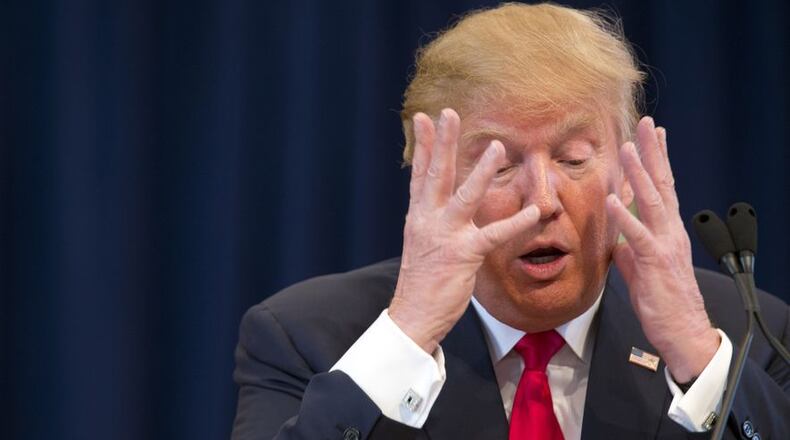Two rules:
1.) Winners don't whine.
2.) Whiners don't win.
OK, maybe that's really just one rule, expressed in two different ways. But I bring it up because over the past couple of weeks, we've seen so much whining from Donald Trump, more whining than you ever thought possible. So much whining as to make you almost sick of whining, enough to make you say please, please, no more whining, we can't take any more whining!!
Trump has whined about the delegate selection process in Colorado, where he got outmanuevered to such a degree that a top Trump aide accused the Ted Cruz campaign of deploying "Gestapo tactics". To a crowd in New York this week, Trump complained that "We should have won it a long time ago. But, you know, we keep losing where we're winning."
He has whined as well about the outcome in Louisiana, where he beat Cruz by less than 4 percentage points in the popular vote but where Cruz, by deftly working the system, has come away with more delegates.
"I end up winning Louisiana and then when everything is done I find out I get less delegates than this guy that got his ass kicked, OK?" Trump whined Monday. "Give me a break. Really disgusts me. So it's a very sick system.”
And of course, he whines endlessly about the possibility that he could end up losing the nomination in an open convention in Cleveland. The longstanding GOP rule that a candidate must win a majority of delegates, not just a plurality, amounts to "crooked shenanigans," as he puts it.
And on and on....
Welcome to real life, Mister Trump. Running for a major office, like running a government, requires more than spouting off in front of a TV camera. It requires organization and attention to detail, like ensuring that your family is registered to vote in time. And no, there's nothing unfair about it. To the contrary, it is essential to the process of winnowing out the weak and unqualified.
It's like this: If you can't master the rules of the Republican Party, then your chances of mastering the intricacies of the federal bureaucracy once elected president are nil. If you can't attract and keep top staff people to your campaign, then you have no chance of forming an effective White House staff. If the complexities of politicking are too great for you, or if you lack the discipline and commitment to master them, then no, you are not capable of being president of the most powerful government in world history.
Take 2008. In the popular mind, Barack Obama won that year's Democratic nomination and general election largely through the power of his message and strong personal appeal. But the truth is that behind the scenes, Obama built a campaign organization that was far superior to that fielded by the Clintons and then by the Republicans, staffing his organization with top talent and deploying cutting-edge technology that opponents today are still trying to duplicate.
There was no chance that the '08 Obama campaign would have named a complete, unvetted incompetent such as Sarah Palin as his running mate. Obama's campaign manager and his top strategist, David Plouffe and David Axelrod, were never going to be arrested and charged with manhandling a female reporter, and they never whined about being outmanuevered by an opposing campaign because they made sure that wouldn't happen in the first place.
Then, when it came time to build a staff and organization in the White House, that same disciplined approach was put into place. I've mentioned before that whatever you think of its policies, the Obama administration has proved to be among the most scandal-free in U.S. history, without a single major appointee removed or indicted for corruption. The primary reason is that they prepared, building a personnel system that culled out suspect job candidates long before they could prove an embarrassment.
They have governed as they had campaigned, and we can fully expect that a Trump administration would do the same.
About the Author
The Latest
Featured



